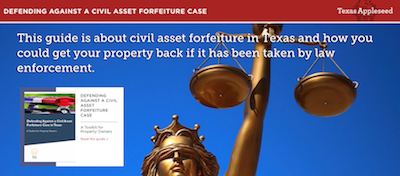
2017 Legislative Priority: Eliminate the Practice of Civil Asset Forfeiture
Updated: March 27, 2017
Currently, there are six bills related to asset forfeiture that have been sent to the either the State Affairs or Criminal Justice Committees in the Senate and nine bills that have been sent to the Criminal Jurisprudence Committee in the House. The most comprehensive of these bills are companion bills SB 380 (Burton) and HB 1364 (Thompson). These identical bills will repeal civil asset forfeiture and establish criminal asset forfeiture. Simply put, these bills will still allow property to be seized, which will enable law enforcement to continue to do its job, but they will not allow for a forfeiture to take place unless – and until – there has been a conviction, which will protect innocent property owners' property rights.
Thirteen other bills concerning civil asset forfeiture seek to do the following, among other things:
- move the burden of proof from the property owner to the State,
- change how the proceeds of asset forfeiture are distributed,
- limit equitable sharing with the federal government,
- change the standard burden of proof from preponderance of the evidence to clear and convincing,
- increase reporting requirements to provide an accurate picture of whether civil asset forfeiture is actually stopping and prevent crime, and
- require reimbursement for storage fees and provide for attorney's fees after the dismissal of a civil asset forfeiture suit.
Each of these changes individually is a positive improvement upon the current process, but SB 380 and HB 1364 would provide for the comprehensive change necessary to truly protect property owners while continuing to allow law enforcement to utilize the tool of asset forfeiture to protect Texans across the State.
Important Actions You Can Take Wednesday, March 29, 2017
On Wednesday, the House Criminal Jurisprudence Committee's Subcommittee on Asset Forfeiture will hear testimony on all nine House bills on this issue.We ask Texans to be heard – see below for important actions you can take!
- Consider providing testimony in favor of these bills, with specific emphasis on HB 1364. All public testimony will be limited to three minutes and all written testimony will require seven copies to be submitted to the Subcommittee.
- Another important step is to contact the offices of the House Criminal Jurisprudence Committee and the Senate State Affairs and Criminal Justice Committees to show your support for these bills.
- Finally, contact Senator Konni Burton and Representative Senfronia Thompson to thank them for putting these comprehensive bills forth and to show your support.

New Resource for Texans
As we work toward legislative change, Texas Appleseed has released a toolkit for property owners to enable them to exercise their rights and protect their property. Go to www.EndForfeitureAbuseTX.org.
The Scoop on Civil Asset Forfeiture

Civil asset forfeiture is a tool meant to be used by law enforcement to stop and prevent crime. Unfortunately, the law in Texas compromises individual property rights, allowing local law enforcement agencies to reap rewards from innocent property owners.When a law enforcement officer claims that there is reasonable cause to take an individual's property, the onus is on the property owner to prove that his/her property is not contraband and therefore is not subject to forfeiture. The individual must either convince the district attorney where the property was seized that their property should not have been taken, or prove in court – also in the county where the property was taken – that the property has not been used in a crime or was not funded by a crime. All the while, the individual may never be charged with a crime, let alone convicted. Law enforcement has high incentive to take individual property because the agency can keep up to 90% of forfeiture proceeds. There is often little incentive to actually pursue wrongdoers because no conviction is required to keep the seized property. The majority of civil asset forfeiture cases end in a default judgment because property owners do not know their rights or are intimidated by the process of showing up to court to defend their property. Often property owners do not even answer the State's forfeiture petition, resulting in a default judgment.An estimate by the Institute for Justice revealed that Texas law enforcement agencies acquire approximately, on average, $41.6 million per year in forfeited property proceeds.
Original Post: January 27, 2017
Texas law enforcement agents seize millions of dollars every year during traffic stops, simply by asserting that they believe the property is connected to illegal activity. This often occurs without the agency pursing corresponding criminal charges against the property owner, which should form the basis of the forfeiture. Law enforcement agencies are entitled under Texas law to keep the proceeds from the property they seize. We have seen heartbreaking stories of people stopped for minor infractions like using the left lane on a highway without passing, and then having their assets seized unless they have the time and resources to prove that their money or belongings were not involved in criminal activity. Texas Appleseed supports eliminating the practice of civil asset forfeiture by converting it to criminal asset forfeiture, which would provide greater protections for innocent property owners.
This issue falls under ourCourts & Due Process work.
For a full list of our priorities,click here.